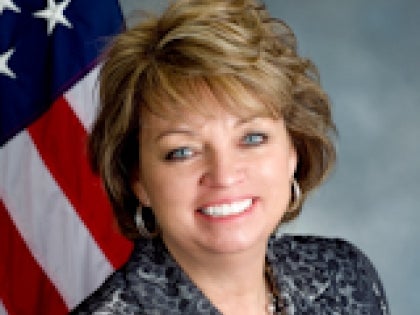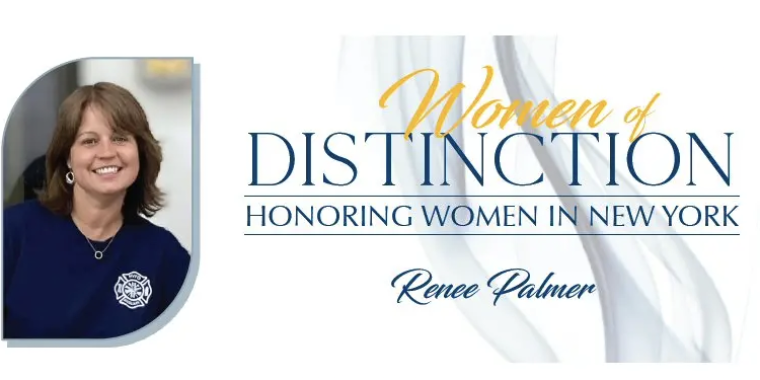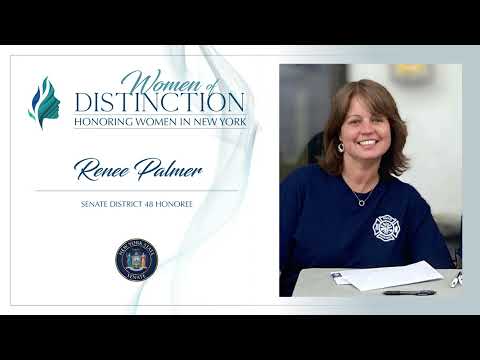
Miss N.y. Fields Residents Questions on Bullying
Patty Ritchie
February 2, 2012

Online Forum Sponsored by Senator Ritchie
State Senator Patty Ritchie today hosted an on-line Q-and-A with Miss New York, Kaitlin Monte fielding questions from constituents about the growing problem of schoolyard bullying.
Ms. Monte, 22, is traveling the state to talk about bullying—including her own personal experiences as a bullied child—and the lifelong impact it can have on children. She’s particularly focused on the problem of online, or “cyber-bullying.”
At Senator Ritchie’s invitation, she stopped by Watertown’s Dulles State Office Building, and spent more than 30 minutes responding to questions that were submitted by residents of Oswego, Jefferson and St. Lawrence Counties.
“Kaitlin’s message and work is aimed at reducing bullying incidents by teaching children about the serious and lifelong impact that words and actions can have,” Senator Ritchie said. “By sharing her own life story, she’s helping to inspire other young people and their parents, helping promote courtesy and common sense, and helping children grow to be courageous and healthy adults.”
A transcript of the Q-and-A can be seen below.
Q&A with Senator Ritchie and Kaitlin Monte, Miss New York 2011
Thursday, February 2, 2012
Senator Patty Ritchie: Kaitlin, welcome. Thank you for agreeing to meet with me, and take some questions concerning bullying. First, tell me what you’ve been doing. How did you get involved in helping to educate children about bullying?
Kaitlin Monte: I’ve been going all over the state and I tackle bullying on multiple levels. First there’s speaking with students. I speak to students in small groups, large assemblies, and I don’t go over the basics, so much because I think students know that. What I go over is what can they do? How can they fix it? How can we empower them right now to realize they are part of the solution. And lot of that is based in emphasizing leadership skill. I also started a nonprofit.
I figure a big solution to bullying is to help students broaden their scope. In middle school, or high school, things become very serious, very quickly, when it’s a matter of social issues. We can help them see beyond that. See that they’re part of a bigger world. Bigger places to fit in. Other opportunities. And I think we can really help them see beyond the issues that they are facing.
I also work with a lot of small groups. Students working on projects, those that have asked for my help, and I’ve also been in touch with a lot of the anti bullying organizations across the country. With the new Dignity for All Students Act, I’m working with some of those organizations to try to put together curriculum based on what that policy is going to require. So trying to touch this issue on every level and make sure we are making connections that are making an impact.
PR: I appreciate you being here once again, and willing to take some questions from my constituents. I was pleasantly surprised by the number of questions, We probably won’t be able to get to all of them, but we’ll try to do as many as we can. I think this is a good first question. How does one become a bully?
KM: I always say that bullying is a learned behavior. Most students and people who bully are seeing it somewhere else, they are experiencing it somewhere else. So they have negativity coming into their lives, be it because of frustration with their academics, family issues. They have negativity coming in, and they’re seeing negativity, and then they’re turning around and they are projecting that on other students.
Many times the bully has no personal qualms with the person that they are picking on. It’s a learned behavior. You become a bully because you have that negative behavior coming into your world and you need to release it onto something or someone.
PR: John from Oswego wants to know HOW CAN WE HELP SCHOOLS IMPLEMENTS THE DIGNITY FOR ALL STUDENTS ACT SET TO TAKE EFFECT JULY 1? He says his school has included it in its Code of Conduct, but that there may be a need for training.
KM: I think that s the biggest thing about Dignity for All Students that it will require that training. They haven’t formalized the requirements yet but a big that parents can do, community members, is to look at that Code of Conduct, and decide whether they feel that is clear enough and strong enough, and something that is reflective of the community. Parents can get together and help the schools rewrite it if they feel that’s what it needs. And for the schools looking for the best curriculums and programs to train their staffs. Because the school policy is trying to equip the schools and the teachers with the tools they need to feel like they can be in control of the issue and able to help because a lot of the times adults don’t feel like they don’t know what to do because there a lot of it in cyberbullying, that’s new technology that adults aren’t as familiar with , so to be able to find the best , and not reinvent the wheel, and be able to take advantage of the work that a lot of these national organizations have done. The Ophelia project is one that I work with that has a tremendous amount of curriculum available and a lot of works to train people on every level including educators.
PR: With the technology era, when people use cyberbullying, it really can go out so quickly and be a detriment to people who are on the other end of it. On Facebook, Wendy shares a problem she’s having with a 16 year old who is acting out, and she doesn’t know where to turn. What would you say to that child?
KM: It’s important that kids talk to a lot of people. I typically will ask students if they’ve experienced a time where they’ve asked a parent or an adult for help and didn’t get the help they needed. A lot of them feel that way, whether it’s a parent or a teacher or a person responded or not doesn’t necessarily reflect whether a student felt it was helpful. So I say if you’re not getting the help you need you have to keep asking. You have to keep reaching out and finding the person who is able to bring the help that you need. It’s important that you not stop just because the first person you asked didn’t get you what you needed. Keep going around and finding a person, build the support you need from multiple individuals. You have to keep talking. Adults can’t know, parents can’t know what the problem is if the students don’t speak up.
PR: Ken questions whether bullying is really is a “growing” problem. He says we should do more to keep marriages and families together to help children from “acting out.” What do you think?
KM: I think he’s totally right. When I saw this issue from the start there is a cultural movement toward the acceptance of negativity. When you look at the media, the media plays a big role in the kinds of TV shows that are putting on the air, and access that kids have now to television and the Internet, they’re seeing it, and they’re learning it. They watch shows where you treat your friends poorly and you’re still friends at the end of the day, why wouldn’t they think that’s the way to behave. It’s important that it’s being learned at home too, because that’s where so much of it falls apart. You can teach positive behavior at school, but when you go home, you have families who are not demonstrating positive problem solving skills and interactions in front of their children then you don’t have the child learning and getting that reinforced . It really is something we need to tackle. It’s not just a playground problem. It’s a matter of social awareness. We need to think a little bit less about ourselves and a lot more about how we are contributing to the culture around us. With the Internet now, everything you do, everything you put up influences other people and we need to realize what a powerful opportunity to do so much better.
PR: Mike is telling me in an email that there is a problem with a coach in his school district who has bullied and verbally abused students “for years.” He says – QUOTE—“Everyone is concerned, but is afraid to act.” Do you have any advice for these parents and students?
KM: They have to get over their fear. I had a sister who lost a college degree because of a bullying professor. She dropped her major in her final semester because he taught the last class and he was so verbally and emotionally abuse to her that she couldn’t stand being with him anymore. What we’re seeing in situations like what happened at Penn State, once one person spoke up or once the situation got out, then people say that you can get a positive, supportive response, then more cases broke out because more people wanted to get this off their chest. They wanted a solution. Until someone talks, no one knows what’s going on. It’s really especially up to the adults, if they know because they have a voice within their school district. The kids don’t always have that voice. As adults and parents they need to advocate for their kids.
PR: Barbara says that she doesn’t feel that schools take bullying complaints seriously enough. How can students make sure that their concerns are being heard?
KM: This is another case of talk to as many people as possible, for students, and talk to the parents. Like I said, the parents have a voice. Go in and ask your schools, what are you doing? Go in and say the Code of Conduct isn’t strong enough or that I don’t feel it’s clear enough. You have to speak up. It’s also a matter of the ‘blame game.’ Parents can’t expect schools to handle this alone. Schools can’t expect parents to handle this alone. It’s a communal effort. It can’t just be, ‘It’s his fault; It’s her fault.’ It really needs to connect everyone coming together. Schools need to be taking it seriously. When you’re forced to give up your child for eight hours a day for the sake of their education, you need to be able to trust that they’re in a safe care as you would provide yourself. It’s the school’s responsibility to make the parent comfortable, not only with the education, but also with the social development they see that they are providing for the students.
PR: Marlene worries that some kids fear telling a parent or teacher will only make it worse. How can they let someone know they are victims?
KM: There is a term called “the momma drama,” where a parent or adult has an emotional reaction whether it’s cyberbullying or sexting, and they freak out in front of the student, or they yell, or they get upset. And that’s something that parents need to realize. There’s a time and a place to get upset, but by the time a student reaches out to you, that’s not the time to get upset. That’s the time to help. A lot of students won’t participate as a bystander in asking for help because they don’t want to be the next victim. That’s when the schools need to demonstrate and show that there’s a safe, secure way for you to come to us and tell us, and that we will be not only by the victim’s side, but on your side. And also by the bully’s side, so that the bully doesn’t feel they’re getting abandoned and yelled at. That they feel they are getting the help they need. Because by lashing out they really in many ways are asking for help on their own.
PR: Steve wants to know, What’s the difference between “bullying” and just regular kid stuff, fooling around, picking on someone?
KM: The big thing that I tell students is it’s teasing and playing as long as everyone’s ok with it. If you said to the person that what you’re doing is hurting me, and they choose to continue, that’s when I see it crossing over into bullying.
PR: Here’s the other side of that question. Anne says she was a victim back in 1959. She suggests “reverse psychology.” Ignore the bully and he will go away.
KM: That’s something that they talk about in terms of the fact that bullies will bully because they know they will get the reaction they want, and they know their actions are going to reach the victim. If you’re writing something personal on Facebook, or on line, you’re doing it because you know that the other person is going to read it, and that makes you feel powerful and in control. If you block the bullying, whether it’s you block them, or the people around you help by being strong bystanders and blocking it, the bully can’t reach his victim, then they’re not going to continue because their efforts become futile and that reverse psychology really does work. Don’t give them what they want, and they won’t ask for it anymore.
PR: “Miss Georgia” wants to know what you think about bullying in the workplace. How do you deal with an overbearing boss?
KM: I think in the workplace it’s just as serious. Like I said, it’s a cultural thing. You have to take steps. “Stop, Block and Tell” is something I teach kids. But the theory itself is relevant everywhere. Stop, meaning tell the person you want them to stop. And in the workplace you can do that. Block, means don’t allow them to continue. Ask to be moved to a different team, or to be put somewhere else in the office, if it’s a matter of being near that person. And then tell, means to alert people and let them know. You have to speak up or no one’s going to know there is a problem. I think it’s the same exact thing. I don’t think anyone can belittle it just because you’re adults, and you should be able to handle it. If there’s anything that’s standing between you and your happiness, and a person is intentionally doing that, then you need to take it seriously.
PR: Shirley says bullying occurs not just in the classroom, but on the bus—even at the corner store. What do you do outside the school setting?
KM: Bullying has to be dealt with as a community wide effort. It’s not just teachers and parents who need to be educated on this, it’s the bus drivers, and it’s the shop owners, and the community leaders. Everyone needs to, because if there’s a place they can get away with it, they’ll go there because they can. So if we make a community where there’s no place they can go, where it’s allowed, then it will start to dissipate. It’s a matter of everyone realizing its within their power to play a role in the fight against bullying.
PR: Joy suggests that bullies could be victims themselves—maybe in the home. Is that a cause of bullying? What do you suggest a “bully” should do?
KM: Absolutely that’s a cause. It happens all the time. Bullying is gaining control, of feeling powerful through negative choices. Leadership is gaining control and power through positive choices. When a child feels the need to get control of their life because there is something going on, they need to find a more positive way to have that outlet, or they need to find a way to ask for the help they need. Again, I can’t reinforce it enough, if people don’t know it’s going on, they can’t help. And it’s up to schools to not victimize the bully. Communities can’t criminalize the bully. They really have to look at it as a case of another victim in the situation. You can’t make them a criminal, You can’t make them feel like a bad guy, and that they’ve lost the fight, and they are just looked upon as negative. They need help, especially when it’s young people. You can’t give up on them that easy.
PR: Raymond wonders what happened to respect for authority? For teachers? School administrators? Bus drivers? Even cops?
KM: Yeah! It’s amazing how that has changed. I see it a lot in students. I think that I’m seeing the matter of parents who want to be a best friend instead of being a parent. Or teachers who are doing the same. You have situations where parents say, Don’t parent my kid. Don’t tell me what to do. You need to stand up and someone needs to teach them these behaviors. If no one’s teaching them that no one’s demonstrating that for them, they’re learning that disrespect in any way, then we can’t expect them to do it themselves. You have to be teaching it somewhere, and reinforcing it everywhere.
PR: Dawn-Marie from Oswego wants to know about the link between bullying, low self-esteem and suicide.
KM: Studies have shown such direct links and anyone who’s been bullied has felt that direct effect that it has. That’s why it is such a different generation now. It’s not a question of toughening up, when you’re dealing with cyberbullying when you can’t even get inside your own house and be safe. What someone writes on line is there all the time, and you can sit on your computer and read it over and over. It’s like getting punched over and over and over. The pain doesn’t stop. You can’t even move across the country and get away from it. It’s 24 hours and, yeah, it really is a matter of taking this very seriously now.
PR: Judy asks if there is a connection between being a victim of bullying and domestic violence later in life.
KM: There’s definitely connections. People who are victims are far more likely to fall into victim roles later in life. Just as bullying is a learned behavior, so is victimization, which is why they need to be taught the skills to stand up, for not only coping, but defending and standing up for themselves. I see it all as the same thing. Once you learn to be on the negative side of a bad power situation, why do you think you deserve anything else, unless someone stands up and tells you that you deserve better. You see people who get treated like the second class citizen in a relationship, and when they learn that as a child or learn that through their families, that’s the role they will naturally go to, until someone tells them that they deserve better.
PR: Dan is a probation officer in Jefferson County. He says that officers have seen an increase in cases that are directly related to cyber-bullying. He says we need to do a better job being teachers to our children at home and in the classroom—to let them know what’s wrong and what’s right.
KM: If we don’t model it how are they going to know? Especially when they are watching this stuff on television, these negative behaviors, these bad examples. There’s very few role models for them to find right now. There is such a flood of people for people for them to look at, so they need to have someone that they know is a model for positive things. And that can be an educator, that can be teachers, or a parent. It can also be people in the community. We have to model it. We can’t learn it otherwise.
PR: FINAL QUESTION -- Nancy in Ogdensburg wants to know HOW DO WE GET KAITLIN TO COME TO OUR AREA AND SPEAK TO STUDENTS ABOUT BULLYING?
KM: I visit schools all over the state, so if they shoot me an email at schools@missny.org they can ask to be put on my school tour schedule this spring. I’m working with schools and community organizations, even. But anyone who wants me to come, let me know.
PR: Thank you, Kaitlin, for coming to visit with me today. I looked at some of the literature and read over all that you’ve been doing. Anything I can do to be helpful in your cause, let me know.
Share this Article or Press Release
Newsroom
Go to NewsroomRitchie Announces Renee Palmer as 2022 "Woman of Distinction"
September 1, 2022

Senator Ritchie 2022 Woman of Distinction
August 26, 2022


